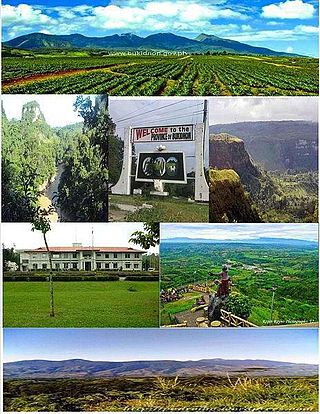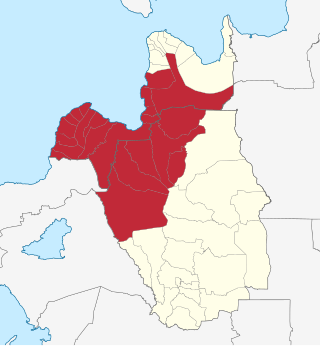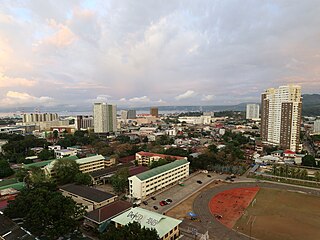Other
- Copa de Oro, football tournament
- Banco de Oro, Philippine banking company
De Oro is a collaborative album made by Astronautalis.
De Oro may also refer to:

Mindanao is the second-largest island in the Philippines, after Luzon, and seventh-most populous island in the world. Located in the southern region of the archipelago, the island is part of an island group of the same name that also includes its adjacent islands, notably the Sulu Archipelago. According to the 2020 census, Mindanao has a population of 26,252,442 people, while the entire island group has an estimated population of 27,021,036 according to the 2021 census.

Bukidnon, officially the Province of Bukidnon, is a landlocked province in the Philippines located in the Northern Mindanao region. Its capital is the city of Malaybalay. The province borders, clockwise from the north, Misamis Oriental, Agusan del Sur, Davao del Norte, Cotabato, Lanao del Sur, and Lanao del Norte. According to the 2020 census, the province is inhabited by 1,541,308 residents. The province is composed of 2 component cities and 20 municipalities. It is the third largest province in the country in terms of total area of jurisdiction behind Palawan and Isabela respectively.
San Pedro may refer to:

Davao de Oro, officially the Province of Davao de Oro, is a province in the Philippines located in the Davao Region in Mindanao. Its capital is Nabunturan. It used to be part of the province of Davao del Norte until it was made a separate province in 1998.
(San) Isidro or (San) Ysidro may refer to:

Los Tigres del Norte are a norteño band from San Jose, California. Originally founded in the small town Rosa Morada in the municipality of Mocorito, Sinaloa, Mexico, with sales of 32 million albums, the band is one of the most recognized acts in regional Mexican music, due to their long history and their successes within the Mexican community in the diaspora. The band is famous for its political corridos, some of which have been censored, even in its own country. The band is the only Mexican group to win 7 Grammy awards and 12 Latin Grammys. In addition, the band has made 40 films alongside the Almada brothers among other well-known Mexican actors.
Del Rey, Delrey or Del Re may refer to:

The following outline is provided as an overview of and topical guide to the Philippines:

Metropolitan Cagayan de Oro, also known as Metro Cagayan de Oro, is the fourth largest metropolitan area in the Philippines. It is located on the northern coast of Mindanao, and comprises the two chartered cities of Cagayan de Oro and El Salvador and the fourteen municipalities of Misamis Oriental which are Alubijid, Balingasag, Claveria, Gitagum, Initao, Jasaan, Laguindingan, Libertad, Lugait, Manticao, Naawan, Opol, Tagoloan, and Villanueva and the six municipalities of Bukidnon which are Manolo Fortich, Baungon, Libona, Malitbog, Sumilao and Talakag. According to the 2015 Philippine census, Metro Cagayan de Oro has a population of 1,687,159 people.

Cagayan de Oro (CDO), officially the City of Cagayan de Oro, is a 1st class highly urbanized city in the region of Northern Mindanao, Philippines. It is the capital of the province of Misamis Oriental where it is geographically situated but governed administratively independent from the provincial government. According to the 2020 census, it has a population of 728,402 people. Cagayan de Oro also serves as the regional center and business hub of Northern Mindanao, and part of the growing Metropolitan Cagayan de Oro area, which includes the city of El Salvador, the towns of Opol, Alubijid, Laguindingan, Gitagum, Lugait, Naawan, Initao, Libertad and Manticao at the western side, and the towns of Tagoloan, Villanueva, Jasaan, Claveria and Balingasag at the eastern side.

Miguel Ángel Chávez Velasco, better known by his ring name Ángel de Oro, is a Mexican professional wrestler who works for the Mexican wrestling promotion Consejo Mundial de Lucha Libre (CMLL). He is currently a double champion in CMLL, as he is the Mexican National Light Heavyweight Champion and the World Tag Team Champion, both in his first reign.

Jaula de Oro is the title of a studio album released by the Mexican norteño group, Los Tigres del Norte, in 1984. It was the first number one on the Billboard Regional Mexican Albums.

MTV Unplugged: Los Tigres del Norte and Friends is a live album by Regional Mexican band Los Tigres del Norte. It was recorded before a live audience at the Hollywood Palladium in Los Angeles, California, on February 8, 2011 and released by Fonovisa Records on May 24, 2011. The album includes featured performances by Andrés Calamaro, Calle 13, Zack de la Rocha, Juanes, Paulina Rubio and Diego Torres.
The 2011 PFF National Men's Club Championship is the 1st season of a Filipino association football competition organized by the Philippine Football Federation and sponsored by mobile phone and Internet service provider Smart Communications. It revives a national tournament discontinued since 2006. The last nationwide competition was a National Men's Open Tournament held in Bacolod under the presidency of Juan Miguel Romualdez. Plans were conceived for a similar national competition under Romualdez's successor Jose Mari Martinez but did not push through for a variety of reasons.
La jaula de oro is a title which can refer to several works:
"Jaula de oro" is a 1983 corrido or cancion ranchera by Enrique Franco, performed by Los Tigres del Norte on the album Jaula de Oro. The subject of the song is US immigration.
La jaula de oro is a 1987 Mexican film directed by Sergio Véjar inspired by the song of the same name.
Ignacio Patiño, better known under the ring names Soul Rocker and Tito Santana is a Mexican luchador, or professional wrestler, currently working for Lucha Libre AAA Worldwide (AAA). He is the son of retired luchador Kendor and actually worked as Kendor II early in his career. From 2005 through 2012, he used the name Tito Santana, although he is not related to the better-known Tito Santana. He began using the name again in 2017 after losing his mask. As Soul Rocker he wore wrestling gear reminiscent of the elaborate stage costumes of the rock group Kiss.
National Route 1 (N1) is a primary national route that forms part of the Philippine highway network, running from Luzon to Mindanao. Except for a 19-kilometer (12 mi) gap in Metro Manila and ferry connections, the highway is generally continuous. Most sections of N1 forms the Pan-Philippine Highway except for sections bypassed by expressways.